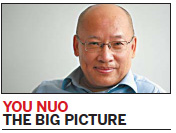Opinion
Urbanization means more than high-rise buildings
By You Nuo (China Daily)
Updated: 2010-03-09 13:06
 |
Large Medium Small |
About China's parliament (NPC), it is easy to say what it isn't. China says it is not a Western parliament. It's easy to understand why.
Some overseas observers dismiss it as only a rubber stamp. But that doesn't explain why they themselves still pay attention to it.
The fair thing to say, as it were, is that it is something in the middle. And for business people, Chinese and foreign, the two weeks or so of meeting does offer a window to find out Beijing's own assessment of its economic conditions and its plan for action.
Last week, at the NPC opening session, Premier Wen Jiabao released his report on the government's work, in which he laid out eight broad areas in which the central government will either be more careful or spend a lot of money. They are very broad indeed, including:
Maintaining a proactive financial policy;

Adjusting the overall structure of industries so as to make it more competitive;
Striking a better balance between urban and rural development;
Introducing a national science and education program and talent development program;
Supporting cultural development;
Improving social security;
Having more projects to further economic reform and opening to the global market; and
Striving for a higher level of public satisfaction with the government's service.
Commentators in the Chinese-language press watched Wen's words closely because they are the central government's to-do list, and essentially key building blocks of its 2010 strategy.
Again it is easy to understand what Wen actually means by figuring out what he doesn't. If all the government's work is inevitably powered by money, then the most important message is the one about financial policy.
The so-called proactive financial policy is the one that Beijing adopted at the beginning of the global financial crisis. This allows the government, in times of crisis and demand contraction, to shore up economic growth by increasing its own spending - financing more public projects and to providing more consumer incentives to the citizens directly.
Wen's statement that Beijing's financial policy will remain in the basic style that it has since the end of 2008 is an answer to some economists' fears of a rising threat from inflation. In fact, from Wen's report, one gets a clear message that it is still too early to say when the global recession will end. Implicitly, for Chinese leaders and their economic advisors, if there is still the danger of a lasting recession and perhaps further destruction of export-related jobs, a certain level of inflation is a lesser evil that this economy will have to live with.
Ample money supply is important in order to keep up domestic demand and hopefully enable some new industries to replace the no longer competitive old ones, as stated in Wen's second point.
Trade figures may be evidence of the change. Commerce Minister Chen Deming reportedly said China's surplus from international trade may have fallen more than 50 percent year-on-year in the first two months of 2010. China's trade surplus in the first two months of 2009 was almost $44 billion.
And all the other points on Wen's list explain where Beijing will spend money earmarked for its proactive policy - along two general lines, namely urban construction and social programs.
In practice, all the hope, from domestic demand to export-substitute industries, comes down to just one word - urbanization.
That covers not just more high-rise buildings and subways, but more importantly, services tied to various social programs now available only in cities, from retirement schemes and diverse education programs, to a more developed medical care system. China has no other choice.
The author is business editor of China Daily.













